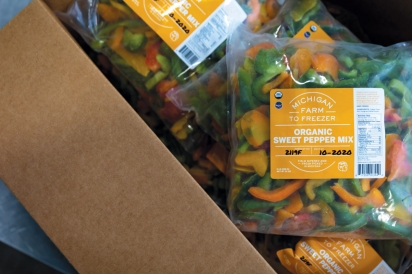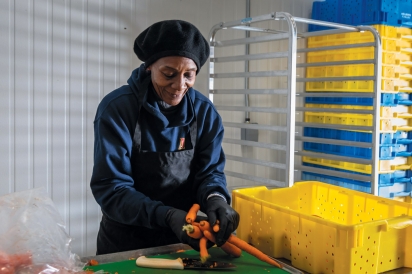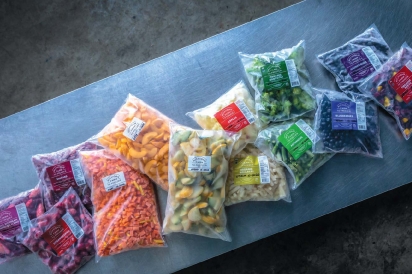Farm to Freezer Provides Fresh, Local Products for Michiganders Year-Round
Have you ever wished you had fresh Michigan cherries in the winter?
Farm to Freezer is here to provide that. It’s the large, ominous warehouse in Eastern Market on Mack Avenue and Orleans with a massive strawberry painted on the front. And its name describes exactly what the company does: It takes fresh local fruit and produce—days, often only hours, after harvest—and flash freezes it for consumers to enjoy in the winter months.
Farm to Freezer was started by Brandon Seng and Mark Coe in 2013. At the time, Seng was managing a workforce development program in Manistee County overseeing the school lunch programs in the area. He was buying fresh produce from Coe, who was managing Lutz Farms. Seng was freezing fresh produce so students would have local fruits and vegetables to enjoy in the winter months. Seng and Coe saw the demand for fresh, frozen produce beyond school lunches, as well as an opportunity to support Michigan farmers. Thus, Michigan Farm to Freezer was created in 2014.
Within a year the business doubled in size. And again the next year. “In 2016, business just exploded,” says Coe. The duo looked beyond their home base in Northern Michigan. Seng looked to Detroit’s Eastern Market and acquired the former Cattleman’s warehouse that had been vacant for 10 years. The 14,000-squarefoot space provided ample room to expand Farm to Freezer. Eastern Market also contributed $400,000 for the build-out through funding received from the U.S. Department of Health and Human Services.
While Seng handled the build-out of the new warehouse, Coe remained up north overseeing day-to-day operations. Seng outfitted the warehouse with a processing area, a holding freezer and a massive sub-zero storage freezer. The freezer maintains a temperature of –10 degrees Fahrenheit and can house more than 700 pallets of products. After six months of remodeling, Farm to Freezer officially made the move to Detroit in 2018.
At the Eastern Market warehouse, fresh products are delivered days, often hours, after harvest. “Strawberries are literally dripping with juices when we receive them,” Seng says. “As that produce sits on a grocery store shelf it’s losing nutrients. The faster we can get it through and into the processing, the sooner we can stop the degradation process.”
Once fresh products are received, they are immediately placed under refrigeration to await processing, where it’s cut and sometimes blanched. It’s then moved to the massive freezer which flash freezes upwards of 3,000 pounds of produce to –30 degrees Fahrenheit in less than 90 minutes. Finally, the frozen products are placed in two-or five-pound plastic bags and placed back in the freezer, waiting to be shipped.
Their wholesale and retail bags are transparent, unlike other frozen products stored in white or multicolored bags. “All of the plastic used for the bags is totally recyclable in Michigan.” Seng says. He also explains the sustainability of freezing local products. Despite operating a massive freezer year around, it’s still more environmentally friendly than importing produce from other countries. “We’re buying Michigan products and contributing to local Michigan economies,” Seng says. “Even though the product is frozen, nutritionally it’s the same as the fresh product on the shelf— the main difference being it was grown by Michigan farmers.”
Throughout the harvesting season, Farm to Freezer buys a 12-month supply of crops from more than a dozen Michigan farms. Asparagus is harvested and processed in May, strawberries in June, cherries in July, and broccoli and cauliflower in the fall. For reference, they purchased more than 200,000 pounds of blueberries and 40,000 pounds of broccoli this year. Overall, Farm to Freezer will process more than 1 million pounds of produce in 2019, which also includes the organic products they freeze.
Farm to Freezer doesn’t do big commodity items like corn and soybeans. “We focus specifically on Michigan specialty crops,” says Coe. “In wintertime when local food is scarce, we’ve got plenty of food in the freezer to serve people Michigan-grown products year-round.” Beyond flash freezing fresh produce, Farm to Freezer implements a workforce development program, which is a top priority for Seng and Coe. “We hire a lot of folks coming through transformation in their lives. A lot of folks are coming from prison, addiction, homelessness,” says Seng. “A lot of times it’s simply folks who are looking for a fresh start. We provide an opportunity for them to learn about food and agriculture, to be a member of a team and to move on to achieve jobs in the local economy.”
Participating in charitable organizations is also of utmost importance to the founders. Farm to Freezer works with several nonprofits. One is the 10-Cents-a-Meal program, in which schools are reimbursed with 10 cents per meal for local purchases. “That means federal and state dollars that stay local with our farmers and stay within the state, which helps these rural communities we work with,” says Coe.
More than 100 institutions throughout Michigan buy products from Farm to Freezer, including the University of Michigan. They’re also in more than 300 grocery stores, including 85 Krogers throughout southeast and northern Michigan. The products won’t be found in the frozen food section, though. Instead they are placed in top-display freezers located in the produce department of grocery stores. Seng pointed out that their product is just as fresh, if not fresher, than the produce in the fruit and vegetable displays. “Instead of being harvested early and ripening during transport, all of our product is harvested when it’s ripe.”
For the future, the duo look to distribute to the west side of the state. But for now, their main focus is on perfecting their operation in southeast and northern Michigan. “All in all, we’re workers,” says Coe. “One day we’ll be here chopping broccoli, another day we might be doing a farm walkthrough.” Says Seng, “We walk every field, we know every farmer. We’re relationship-based.”
The company’s name explains what they are, Farm to Freezer. “We don’t put any additives in our products. It’s a simple, whole foods approach to season extension,” says Seng. “We’re a Michigan company through-and-through.”








